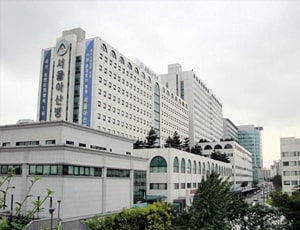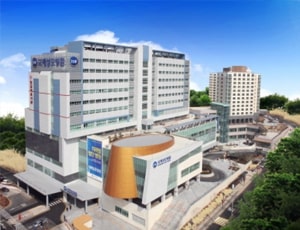The average cost of Ovarian Cancer Treatment in Seoul approximately starts from USD 22800
Treatment cost

Asan Medical Centre located in Seoul, South Korea is accredited by ISO. Also listed below are some of the most prominent infrastructural details:


International St. Mary's Hospital located in Seoul, South Korea is accredited by JCI. Also listed below are some of the most prominent infrastructural details:
Ovarian cancer is the abnormal growth of cells in the ovaries, which are an important part of the female reproductive system. Ovaries are two small glands, located on either side of the uterus. They help produce female sex hormones and store or release eggs. An ovarian tumor is it is the eighth most common type of cancer among women. It is the fifth most common cause of cancer deaths in women around the world. Ovarian cancer can be life-threatening if not diagnosed and treated on time, however, the chances of survival are great in the case of early diagnosis.
Ovarian cancer forms when normal ovarian cell growth fails, and there is an uncontrolled growth of cells. Most of the ovarian cancers arise from the lining cells (epithelium) of the ovary. The ovarian tumor can metastasize and spread to other organs of the body.
Ovarian Cancer Causes: There is no identified and known cause of ovarian cancer. However, there are some risk factors associated with the disease. Family history (genetics) of ovarian cancer, older age, breast cancer, obesity, and endometriosis are some of the known ovarian cancer risk factors. Other than these, menstrual cycles play a major role in ovarian cancer. The higher the number of total lifetime ovulations, the greater the risk of ovarian cancer. That is, women who have had their periods before the age of 12 are at an increased risk of ovarian cancer.
The risk of ovarian cancer is also high in women suffering from familial melanoma, which is characterized by the presence of certain genes. These genes are inherited from parents and mostly occur when two or more relatives suffer from the aggressive form of melanoma or skin cancer.
The kind of ovarian cancer you have depends on where the cancer starts in the body. There are three main types:
Depending on the type, stage, grade of ovarian cancer, and general health of the patient, the oncologist will devise the best treatment plan for the patient. However, a patient’s expectations and desires play a major role in selecting the treatment plan. For example, some patients may desire childbirth in the future, while others could be okay with having their uterus. the Fallopian tubes and ovaries removed.
Surgery: Surgery is often the first and the best treatment for ovarian cancer. Surgical removal of the cancer is done in a vast majority of ovarian cancer patients. The type of surgery opted for depends upon how widespread the cancer is when it is diagnosed.
There are different surgical procedures to get rid of ovarian cancer, such as unilateral oophorectomy (removal of one ovary) or bilateral oophorectomy (removal of both ovaries), salpingectomy (removal of Fallopian tubes), hysterectomy (removal of the uterus), and omentectomy (removal of momentum).
Typically, the organ in question is fully removed in all these procedures. In some of the advanced cancers, complete removal of the cancer cells is not possible. In such cases, the possible amount of tumor is removed in a procedure called debulking surgery.
Chemotherapy: Chemotherapy drugs interfere with the cell division process and damage the DNA of the cancer cells to reduce their number and stop them from growing any further. Patients will often benefit greatly from its use in the case of ovarian cancer because ovarian cancer patients can tolerate it better because of fewer chemotherapy side effects.
In the case of ovarian cancer treatment, chemotherapy drugs can be given into the vein intravenously (IV) or placed directly into the abdomen (IP).
In some cases, chemotherapy may be performed first, followed by surgery. This is called neoadjuvant chemotherapy. Common chemotherapy drugs used to treat ovarian cancer include paclitaxel, cisplatin, topotecan, doxorubicin, epirubicin, and gemcitabine.
Drugs used in chemotherapy travel throughout the body and can also kill a few normal cells in the body, leading to unpleasant side effects. So, chemotherapy should be followed only if the patient can cope with it. Chemotherapy can cause anemia and leucopenia, besides vomiting, diarrhea, appetite loss, hair loss, and fatigue.
Radiation therapy: Radiation therapy uses high-energy X-rays or proton beams to destroy the tumors of ovarian cancer. This can be given as palliative therapy, or as adjuvant therapy combined with surgery or chemotherapy. However, radiation therapy alone does not improve the survival rate in people with well-differentiated cancers. Common side effects of radiotherapy treatment are diarrhea, constipation, and frequent urination.
Hormone therapy: Although estrogen alone does not have any effect on cancer, cutting off a supply of estrogen slows the growth of cancer cells. Hormone therapy can prevent estrogen from reaching the cancer cells, thus suppressing the growth of cancer.
Targeted drug therapy: Newer medications are being developed that can target cancer cells directly, but till now this treatment only helps reduce damage to the normal cells and subsidizes the side effects of chemotherapy.
The journey of recovery following ovarian cancer treatment can be both physically and emotionally challenging, particularly for those who have undergone a complete removal of ovaries and uterus. The abrupt onset of menopause can bring about various side effects, and adapting to life after ovarian cancer treatment may pose difficulties.
For individuals who have undergone surgery as part of their treatment plan, resuming activities such as driving after a month is generally feasible, but it is crucial to consult with the doctor at each stage before making any significant decisions.
Some women may experience challenges in focusing on daily tasks post-treatment. The impact of multiple cycles of chemotherapy and radiotherapy can contribute to a slower recovery. Adequate fluid intake becomes essential to aid in the recovery process and minimize the side effects of these treatments. Additionally, maintaining a well-balanced diet is equally crucial during the recovery period. Seeking guidance from healthcare professionals and adopting a holistic approach can help women navigate the recovery journey with greater ease and resilience.
Ask your healthcare adviser for the best multiple options and choose the one that meets your expectations
In Seoul, the average starting cost for Ovarian Cancer Treatment is $22800. Many multispeciality hospitals in Seoul that are JCI certified are approved and most sought after for treating international patients with Ovarian Cancer Treatment.
Different hospitals have different pricing policy when it comes to the cost of Ovarian Cancer Treatment in Seoul. The cost quoted by some of the best hospitals for Ovarian Cancer Treatment in Seoul generally covers the pre-surgery investigations of the patient. The Ovarian Cancer Treatment cost in Seoul includes the cost of anesthesia, medicines, hospitalization and the surgeon's fee. Post-surgical complications, new findings and delayed recovery may have an impact on the total Ovarian Cancer Treatment cost in Seoul.
There are many hospitals that perform Ovarian Cancer Treatment in Seoul. The following are some of the most renowned hospitals for Ovarian Cancer Treatment in Seoul:
After discharge from the hospital, the patient has to stay for another 16 days in the country for complete recovery. This duration of stay is recommended to complete all the necessary follow-ups and control tests to ensure that the surgery was successful.
There are certain additional cost that the patient has to pay apart from the Ovarian Cancer Treatment cost. The per day extra expenses in Seoul per person are about 40 USD.
The average duration of stay at the hospital after Ovarian Cancer Treatment is about 5 Days for proper care and monitoring. The patient is subjected to several biochemistry and radiological scans to see that everything is okay and the recovery is on track. After making sure that patient is clinically stable, discharge is planned.
Out of all the hospitals in Seoul, there are about 2 Hospitals best hospitals for Ovarian Cancer Treatment in Seoul. These hospitals have proper infrastructure for the treatment of patients who require Ovarian Cancer Treatment. Additionally, these hospitals are known to comply with the international standards as well as local legal requirements for the treatment of patients.
Some of the most sought after doctors for Ovarian Cancer Treatment in Seoul are:
One of the most popular destinations for medical tourism in the world, Seoul, the capital of South Korea attracts around 60% of the patients traveling to the country for quality care. More than 2.76 million International patients travel to South Korea on average. This can be attributed to high-quality medical services, economical healthcare services, and affordable packages that combine both treatment and relaxation. The number of healthcare organizations in Seoul tally up to 21,507. Out of these, 14 are advanced hospitals that provide a range of healthcare services. The high success rate of cancer treatment, plastic surgery, and organ transplants attract the majority of foreign patients to Seoul. Hundreds and thousands of patients from abroad travel to Seoul for cosmetic and plastic surgery. The largest proportion of medical tourists belonged to China and the United States. The top hospitals in Seoul have well-trained medical staff along with coordinators that help international patients availing treatments without any issues.
Seoul has a wide network of internationally accredited hospitals that are using cutting-edge medical technology to treat patients. Some of the top hospitals in Seoul are:
The doctors in Seoul obtained their medical education and training from some of the most reputed medical institutions around the world. Some of the top doctors in Seoul are:
Seoul is a major healthcare center and is well connected to the major cities in the globe via air. You can reach the city by international flights. If you are planning to travel, then we can assist you in making the journey hassle-free.